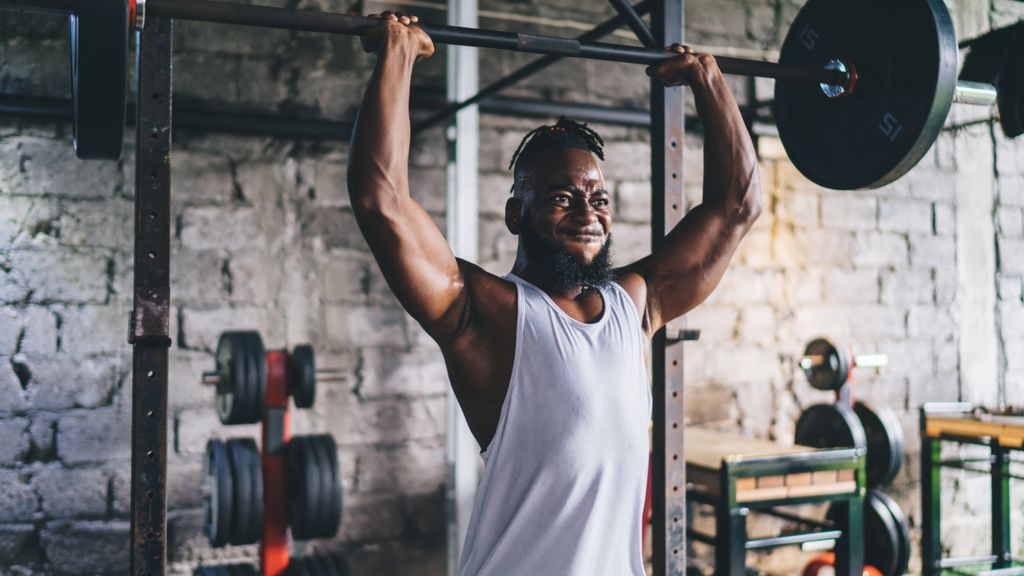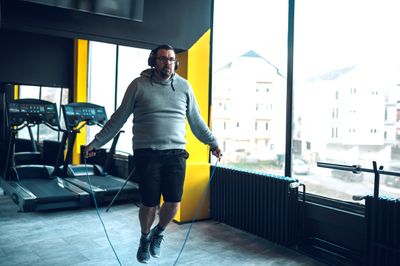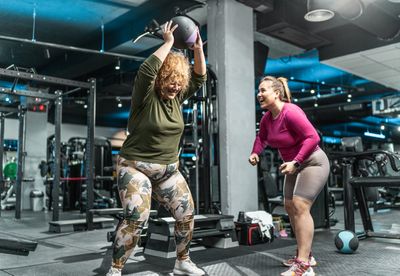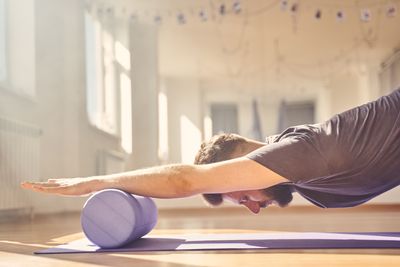
The internet has endless bodybuilding templates, workouts, and coaches promising to get you shredded. Some advice is excellent, while some is… not.
If you want to build muscle and reach your full potential, you need an evidence-based training program and real-world wisdom from people who have been there.
That's why we spoke with two fitness experts who are also experienced bodybuilding competitors and coaches. They gave us all the details on the best programs for every experience level, which training variables matter most, and advice on finding balance and celebrating your success.
What Is Bodybuilding?
Bodybuilding is a strength sport where you shape your physique by building muscle and losing fat. We wrote a detailed guide on its rules, history, and benefits that you can check out if you're unfamiliar.
You may have seen photos of competitors on the day of their show and been inspired by their rippling muscles and ultra-lean bodies. Many clients I have coached have referenced famous physique athletes as their inspiration.
You may also just want to change the way your body looks and get healthier, but where do you start? Is it really possible to transform your body like that safely?
The short answer is yes! But it helps to have tested knowledge from pros who have been there and done that.
Get our fitness newsletter
Stay on track with your fitness goals and get inspired! Sign up for the GymBird newsletter for twice-monthly expert fitness and nutrition tips.
Finding Empowerment and Community Through Competition
R.J. Gibbs holds a Ph.D. in Kinesiology, a Master's in Community Health Education, and is a leading expert on nutrition and behavior change. He's also an experienced bodybuilding competitor and coach.
Gibbs started competing in bodybuilding at age 17 after he watched his mom win second place in a local competition. In just four months, he shed 45 pounds, competed in his first show, and fell in love with the sport.
He went on to compete in many more shows and was inspired to pursue athletics and nutrition education at the highest level. Gibbs credits the intense dedication and focus he learned to harness in bodybuilding for much of his academic and professional success.
He also stresses how supportive and encouraging the bodybuilding community was to him and how it can be a source of lifelong friendships.
"I have a few guys that I have trained with now for over a decade, and we've come to develop a special bond," Gibbs shared.
Complete Guide to Bodybuilding Programming
While most personal training clients I have coached throughout the years want to change how their bodies look, many are confused about how to get there.
So often, they've spent years on fad diets, doing too much or too little exercise intensity, and are frustrated by their results. In this article, I'll share the bodybuilding programs recommended by experts and explain why these templates are just a starting point.
The Search for the Perfect Training Program
Veronica Tearney is a certified strength and conditioning specialist who serves as the director of strength and conditioning for Olympic sports and is a department nutritionist at Syracuse University.
She's also a former track star who missed the thrill of competition when she retired from athletics and found her next passion doing figure shows.
After competing in 10-figure competitions and winning several, Tearney now coaches busy professionals and parents who want to get fitter, leaner, and healthier in addition to her college athletes.
When it comes to choosing the perfect way to structure your bodybuilding workouts–also called training splits–Tearney says there isn't just one.
"You can talk to ten different bodybuilding champions, and they'll tell you ten different ways to train," Tearney shared.
This may surprise you if, like me, you've read countless blogs and magazine articles claiming to have found the 'perfect' way to build muscle or the 'secret' to fat loss.
Training Status
If you've ever tried to find a strength training workout, you'll note that nearly all of them are broken down by training status: are you a beginner, intermediate, or advanced lifter?
Trainers Gibbs and Tearney agree that your training status is determined by numerous factors. Still, each coach has a slightly different take.
"To me, training status is largely determined by your training age, i.e., how many years have you been going to the gym, and how many years have you been seriously dedicated to the gym?” Gibbs said. "Your lifting form is also crucial as poor form will be a rate limiter for muscle growth."
Tearney also factors in the person's athletic history and experience with strength training. She considers them beginners if they haven't participated in athletics that included sport-specific and strength-training sessions.
One interesting factor that did not matter to these coaches as much was the number of training days you hit.
"I've personally been training and competing for decades, and I only train 4 to 5 days per week," sayid Gibbs.
Bro Splits
You may have heard serious muscle enthusiasts refer to their training program as a 'bro split.' The bro split is an old-school, popular favorite program where you train one muscle group daily, usually with five to six workouts per week.
For example: Chest, back, shoulders, legs & abs, arms.
What Really Matters
While it's true that numerous studies have shown twice weekly training is optimal for muscle growth, trainers Gibbs and Tearney caution you against being overwhelmed by the little details.
No matter how many days per week you train, you will continue to see progress if you eat enough and follow these general guidelines.
- Lift at least two days per week, ideally three as a minimum.
- Choose 4-6 exercises for each workout.
- Do 2-3 sets for each exercise.
- For 6-15 reps each set.
- Lift heavy enough that each set's last 1-2 reps feel hard (8/10 effort).
Beyond those basics, what matters most is showing up and working hard consistently.
"Find a trainer and a program that suits your life well and get to work," sayid Tearney.
Regardless of your split, building muscle takes time, and your consistency in training and nutrition are by far the most important factors to focus on.
Bodybuilding Programming for Beginners
Both personal training coaches R.J. Gibbs and Veronica Tearney agree that building muscle as a beginner is simple, and the most important factor to consider when choosing a program is your schedule and lifestyle.
"As a beginner, you just need to focus on getting in and doing the work. Also, ensure you're focusing on good form," Gibbs said. "If you're hitting your macros and getting enough training volume in, you will stay on track."
Bodybuilding Programming Differences for Intermediate and Advanced Lifters
"For intermediate and advanced lifters, we might add in some specialized training such as drop sets or supersets and focus more on lagging muscle groups. Minding our minimum and maximum recovery volumes," said personal trainer R.J. Gibbs. "You need to continue to find ways to overload your muscles."
For more advanced training concepts, workouts, and strategies–check out our guide to Advanced Bodybuilding Training.
Bodybuilding Programming Splits for All Fitness Levels
Note: Fitness templates function as examples and serve as a starting point for your training. There are endless ways to build muscle (or build strength or athleticism) As you progress, you will learn what exercises and programs your body responds best to, and you should use that data to guide your programming.
3-Day Workout Splits
Three-day workout splits are fantastic for beginners, busy people, and anyone who wants to minimize their time in the gym. Beginners need to build their strength and stamina and allow for nervous system adaptations. A three-day program is fantastic for all of the above.
Whether you're a high-powered professional, a busy parent, or don't love lifting but want to build muscle–a three-day split will help you meet your goals.
| Workout Examples | Day 1 | Day 2 | Day 3 |
|---|---|---|---|
| Option A | Full body | Full Body | Full body |
| Option B | Upper body | Lower body | Full body |
| Option C | Push | Pull | Legs |
4-Day Workout Splits
Four-day splits are also a solid choice for beginners ready to progress and intermediate lifters alike. They allow enough training volume for each muscle group to build mass, but it doesn't feel like your gym program runs your whole life.
| Workout Examples | Day 1 | Day 2 | Day 3 | Day 4 |
|---|---|---|---|---|
| Option A | Upper body | Legs & abs | Upper body | Legs & abs |
| Option B | Chest & Triceps | Back & Biceps | Shoulders & Abs | Legs & calves |
5-Day & 6-Day Workout Splits
Five and six-day splits are where we get into hardcore bodybuilding training. Lifting consistently that many days a week requires a lot of discipline, planning, and dedication, so these programs are usually reserved for lifters who are seriously dedicated to building muscle.
When preparing for a bodybuilding show, consider that you will also have to add additional cardio sessions to this schedule.
| Workout Examples | Day 1 | Day 2 | Day 3 | Day 4 | Day 5 |
|---|---|---|---|---|---|
| Option A | Lower body & abs | Back & chest | Lower body & abs | Chest & shoulders | Back, shoulders & arms |
| Option B | Upper body | Lower body | Chest, shoulders & triceps | Back & Biceps | Leg & Calves |
| Workout Examples | Day 1 | Day 2 | Day 3 | Day 4 | Day 5 | Day 6 |
|---|---|---|---|---|---|---|
| Option A | Chest & Back | Arms & shoulders | Legs & abs | Chest & back | Arms & shoulders | Legs & abs |
| Option B | Back | Chest & abs | Quad | Shoulders | Hamstrings & calves | Biceps & Triceps |
Bodybuilding Competition Prep Considerations
According to bodybuilding coaches Tearney and Gibbs, there are things you should keep in mind before entering the competitive sport of bodybuilding.
"If you're a person with severe body image issues or disordered eating patterns–be careful. The only professionals that are qualified to work with clients with eating disorders are registered dietitians, "Gibbs said.
If you want to participate in a bodybuilding show, you need to be prepared for an extreme workout regimen, plus cardio and a strict diet, and that level of scrutiny and stress can take a toll on your mental health.
Gibbs admits that it is an intense sport, and while bodybuilding-style training is a fantastic tool for many people, this sport itself is not for everyone.
"Physique change is for everyone; bodybuilding competition is not," Gibbs cautions.
Bodybuilding Show Preparation
Most people need three to four months of strict physical training and nutrition for bodybuilding preparation before they step on stage–called prep–but that's only when they've already built plenty of muscle and have a lower body fat percentage.
According to bodybuilding coach R.J. Gibbs, you may need a year or more before you're ready for a formal prep phase and competition.
"It's the coach's job to determine what is safe: Everyone wants to step on stage, but is that something you are physically ready to do?" said Gibbs.
When done healthily, bodybuilding is a sport that is measured in years and spans many cycles of gaining muscle, losing body fat, and maintenance phases focused on performance.
Do You Need A Bodybuilding Coach?
Both bodybuilding experts that we spoke to recommend working with an experienced coach if you plan on competing.
"When it comes to physique competitions, your coach offers an objective eye. There's so much more to competition than just diet. You need someone who can see the subtle changes to your body from week to week and keep you on track and grounded," Gibbs said.
Gibbs goes on to say, "There are also so many other things that go into competition: posing, routine, support the day of–if you've never stepped on stage before, support in these areas can make a big difference in your experience."
How to Find a Qualified Coach
A qualified bodybuilding coach will have experience coaching physique athletes and will often have competed in the sport themselves. They should have a thorough onboarding process that assesses your goals and history. They should also have a plan for after your show.
"Having a plan to transition after your bodybuilding show is crucial for maintaining your progress but also your mental health. I remember having a tough time switching off and transitioning back into normal life," bodybuilding coach Veronica Tearney said.
A qualified bodybuilding coach will help you navigate your training, diet, and the mental hurdles you'll experience. They should support you every step of the way.
Bodybuilding for Life: Tips on Celebrating Success and Finding Balance
Whether you're pursuing a competition or you just want to transform your physique, bodybuilding can be a wonderful source of confidence, discipline, and community.
Manage Your Expectations
Just like training for a marathon, bodybuilding competition prep is a short but very intense period that will require sacrifice and grit. However, prep only lasts a few months, so finding a balance between your life and your training for most of the year is possible.
Your professional, personal, and family time constraints and responsibilities must be considered before embarking on any fitness journey so you can set healthy goals and expectations for yourself.
Find A Supportive Community
While you will build friendships and find community with other competitors, it's
important to note that not everyone in your life may be supportive of your journey.
"Understand that when you start competing, you're going to have people in your life who just don't get it. They're going to make comments, they're going to ask questions.
Be prepared to set boundaries," bodybuilding coach Veronica Tearney said.
She recommends planning ahead and reminding yourself why you started this journey if moments of friction arise with friends or family.
"Establish your support system of friends, coaches, and training partners who serve as a safe space and understand what you're going through," Tearney said.
"Roadblocks are going to come up. If you're training properly and pursuing your goals safely, it's much more of a mental battle to stay on track and see your goals through," coach Tearney shared.
Approaching your training with a focus on your health and the aspects of training you enjoy, and engaging in mindfulness, can all help you deal with the ups and downs of a bodybuilding prep. Your coach can also offer much-needed perspective if body image issues creep up.
Celebrate Your Progress
While bodybuilding coacch Veronica Tearney recalls the joy and immense pride she felt each time she stepped on stage, she wants people to know that there are many different ways to celebrate your hard work.
"You never have to step on stage to be proud of your progress," Tearney said. "Schedule a photo shoot or share progress photos with friends. You don't have to compete for your work to count and be celebrated."
Bottom Line
Competitive bodybuilding can be a huge source of confidence and help you develop your body and mind through hard work and dedication.
There is no perfect bodybuilding program. You can successfully build muscle and change your body by lifting three, four, five, or six days per week. What matters most is your consistency over time and proper workout programming for maximum muscle growth.
If possible, you should work with an experienced coach who can help you set realistic goals and safe time frames if you plan on competing. Most importantly, whether you compete or not, celebrate your success every step of the way.
For the best self-guided training app, try Jefit, and for comprehensive nutrition and training, try Renaissance Periodization.
Bodybuilding Programming FAQs
Do I have to do a bodybuilding show to be a bodybuilder?
You do not have to compete in bodybuilding to consider yourself a bodybuilder. If you are dedicated to building muscle and using weight training to manipulate your physique–you can proudly call yourself a bodybuilder.
How do I pick the best bodybuilding program for me?
The best training and nutrition program for bodybuilding is the one you can commit to and stick with. Have a realistic conversation with yourself, think about how many days a week you can devote to your training, and opt for a program in that range.
Should I work with a coach if I plan on doing a bodybuilding competition?
Yes, you should work with a coach if you want to compete in bodybuilding. Aside from your training program and diet changes, an experienced coach will provide you with much-needed perspective, help you with posing and your routine, and support you throughout prep and the day of the show.
More Bodybuilding Advice
Bodybuilding Guide: Sculpt a Powerful, Ripped Physique
The Bodybuilding Training & Nutrition Playbook: Advanced Concepts & Philosophy
Resources
Sports Medicine. Effects of Resistance Training Frequency on Measures of Muscle Hypertrophy: A Systematic Review and Meta-Analysis.



